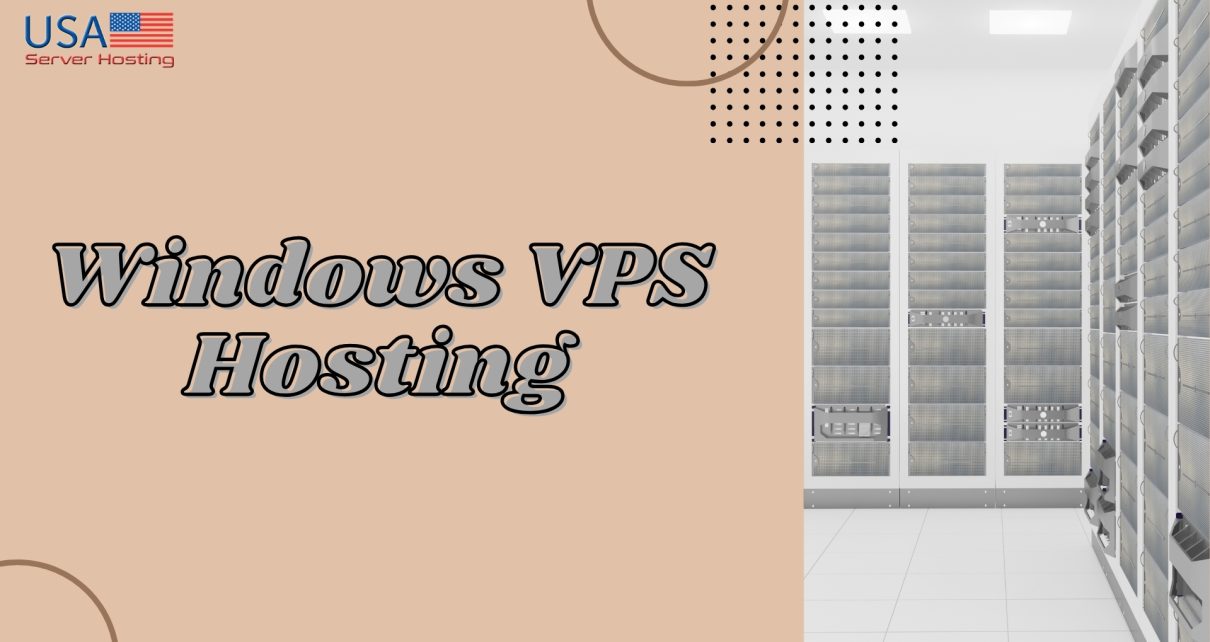Security has emerged as a top priority for both consumers and enterprises in the rapidly changing world of Internet technology and data management. It’s critical to make sure your Windows virtual private server (VPS) is safe from potential threats and vulnerabilities given the growing reliance on VPSs for hosting websites, apps, and data. You may protect your important data and uphold the integrity of your online presence by reading this article, which will cover best practices and security enhancement suggestions for Windows VPS Hosting environments.
Comprehending Cheap VPS Hosting
Before delving into security protocols, let us recap the basics of USA Windows VPS. A virtualized server known as a virtual private server (VPS) coexists with other VPS instances on a real host. Every VPS has its dedicated resources, such as CPU, RAM, and storage, and operates on its own. Because VPS Hosting exclusively uses the Windows operating system as its basis, it is the best option for hosting websites and apps that are built on Windows.
The Significance of VPS Protection
Your Windows VPS must be secured; it is not an option. The following are some main justifications for why VPS security needs to come first:
- Data protection: Sensitive information including financial records, client lists, and proprietary software probably resides on your virtual private server (VPS). To safeguard your company’s brand and operations, you must guarantee the protection of this data.
- Business Continuity: Operations disruptions caused by outages or data breaches can result in monetary losses as well as harm to your company’s reputation. Strong security protocols aid in preserving business continuity.
- Legal Compliance: Many sectors have unique rules surrounding data security (e.g., GDPR, HIPAA). Non-compliance might result in serious penalties, making security measures vital.
- Reputation management: A security lapse can damage your company’s standing and reduce consumer confidence. Maintaining a favorable reputation with your clients can be achieved through implementing robust security protocols.
Best Practices for Best VPS Hosting Security
- Regularly Update and Patch: Keeping your Windows operating system and all installed software up to date is the first line of defense against potential vulnerabilities. Cybercriminals often exploit outdated software to gain access to servers Turn on automatic updates, and check for fixes on a regular basis.
- Utilize Strong Authentication: Implement strong and unique passwords for all user accounts and change them regularly. Multi-factor authentication (MFA) is a security feature that you should think about implementing. Disable any default or unnecessary accounts to reduce the attack surface.
- Firewall Configuration: Configure the built-in Windows Firewall or use third-party firewall software to control incoming and outgoing traffic. Allow only necessary ports and services to reduce the risk of unauthorized access.
- Often Scheduled Backups: It’s critical to regularly back up the data on your VPS. You can restore your system to a prior state in the event of a security incident or data loss. Make sure backups are conveniently accessible and safely kept for future use.
- Install Antivirus and Anti-Malware: On your Windows VPS, install dependable antivirus and anti-malware software. Plan routine scans and maintain the antivirus definitions current to quickly identify and eliminate threats.
- Monitoring and Logging: Install monitoring software to keep tabs on security incidents and server performance. Keep an eye on the logs for any odd activity, and set up alerts to instantly notify you of any questionable activity.
- Restrict User Privileges: Adhere to the least privilege (PoLP) principle by giving users just the authorization required to complete their jobs. Steer clear of using administrator credentials for everyday tasks.
- Secure Remote Access: If you need remote access to your VPS, use secure protocols such as SSH (Secure Shell) or VPNs (Virtual Private Networks). Disable Remote Desktop Protocol (RDP) if not needed and limit access to specific IP addresses.
- Frequent Security Audits: To find and fix any possible vulnerabilities in your VPS hosting environment, do regular security audits and vulnerability assessments.
- Keep Up: Remain updated on the most recent security issues and patterns. To stay current with the latest developments in the field, follow industry blogs, sign up for security newsletters, and attend conferences or webinars.
Extra Advice for Strengthened Security
To further improve the security of your USA Windows VPS, take into consideration the following extra advice in addition to the previously mentioned recommended practices:
- Network Segmentation: To protect your VPS from potential attacks, keep it apart from other networked devices.
- Encrypt Data: When sending and receiving sensitive data, use encryption.
- Regularly Remove Unused Software: To lessen the attack surface, uninstall any programs that are not needed.
- Penetration Testing: To find weaknesses before malevolent actors do, run regular penetration tests.
- Security Policies: Create and implement security policies that specify best practices and requirements for all users inside your company.
- Emergency Response Strategy: Establish a clear incident response strategy so that you can act quickly in the event of a security breach.
Advanced Security Protocols
- The use of containers: To isolate apps and services within your VPS Hosting, take into consideration containerization solutions such as Docker. By dividing up processes, containers can improve security by lessening the possible impact of a security breach.
- Firewall for Web Applications (WAF): Installing a web application firewall will shield your websites from common application-layer dangers such as cross-site scripting (XSS) and SQL injection assaults. Incoming HTTP/HTTPS traffic can be filtered and monitored by a WAF, which can stop malicious requests.
- Systems for detecting intrusions (IDS) and preventing them (IPS): To identify and stop erroneous system activity and network traffic, put in place an IPS and an IDS. In real-time, these systems can assist in identifying and reducing hazards.
- Information and Event Management (SIEM) for security: By centralizing the gathering and examination of security-related data from several sources, an SIEM solution can enable preemptive reactions and offer insights into possible risks.
- Frequent Vulnerability Assessments: To find vulnerabilities in your VPS and apps, do automated vulnerability checks regularly. Quickly fix vulnerabilities to reduce risks.
- Plan for Disaster Recovery: Create a thorough disaster recovery plan that describes how to bounce back from major failures, data breaches, and security events. Test the plan often to make sure it works as intended.
- Awareness and Training in Security: To make sure that everyone on your team is aware of security best practices and can identify possible dangers, consider investing in security training. Security breaches are frequently caused by human error.
Services for Cloud-Based Security
For improved security, think about using cloud-based security services:
- DDoS Defense: To defend your virtual private server (VPS) from extensive DDoS attacks, make use of the Distributed Denial of Service (DDoS) mitigation services offered by your hosting company or independent contractors.
- Services for Managed Security: Managed security services, which include frequent security audits, monitoring, and incident response, are provided by numerous hosting companies. These services can relieve security-related burdens and offer comfort.
In summary
Maintaining company continuity, safeguarding your data, and upholding your reputation all depend on the security of your Managed VPS Hosting. You can build a strong defense against potential threats and weaknesses by putting the best practices, advice, and cutting-edge security methods described in this article into effect.
Recall that maintaining security requires both human and technological cooperation. Keep up with new threats, make security solution investments, and train your staff on security best practices. You can reap the rewards of a dependable and safe hosting environment for your Windows-based apps and websites by taking a proactive approach to VPS security.




